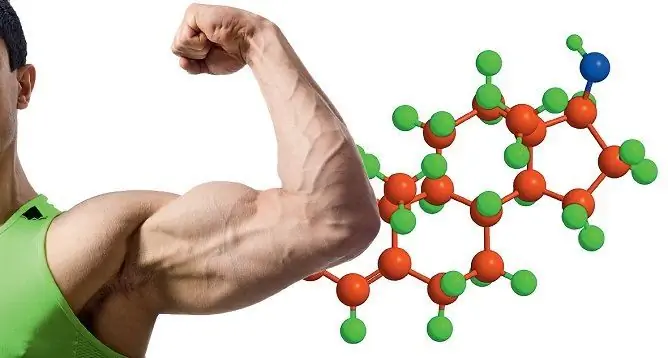- Author Rachel Wainwright wainwright@abchealthonline.com.
- Public 2023-12-15 07:39.
- Last modified 2025-11-02 20:14.
Lethal doses

Everything in our life is relative. Paracelsus, the founder of modern pharmacology, spoke very well on this topic: “Everything is poison, everything is a medicine. Both depend on the dose."
It would seem that completely ordinary things that we use daily throughout our lives can lead us to death. Therefore, it is very important to know when to stop.
Alcohol
If an ordinary person weighing about 75 kg drinks three bottles of vodka at once, i.e. 1-1.5 liters, then in all likelihood it can be argued that he will die. Better not to test it yourself.
A lethal dose of alcohol in the blood is considered to be 5-6 ppm, which is equivalent to 400-450 pure alcohol.
But, as you know, there are exceptions to every rule. In December 2004, in the Bulgarian city of Plovdiv, a man was hit by a car. When he was taken to the hospital, it turned out that the man was very drunk. Having checked it for a breathalyzer, the doctors were horrified - it showed 9.14 ppm. To eliminate the possibility of error, the doctors made the patient five more different alcohol tests, and they all showed the same result. It turns out that the man drank an average of 1.7 liters of vodka (or other strong alcohol) and survived.
The sun
If the average European resident spends 8 hours under the scorching sun, he will die. It takes 2 to 8 hours to get severe heatstroke. At first, a person feels weakness, dizziness, headache, tinnitus, nausea. Then the body temperature rises to 40-42 degrees, the pulse and breathing become more frequent, blood pressure drops and the person loses consciousness …
If you suddenly feel similar symptoms, do not go abruptly into the shadows - this will make it even worse. Better call an ambulance right away.
Vitamins
It turns out that vitamins kill too. There is even such a concept - hypervitaminosis. Excessive use:
- vitamin B1 can cause kidney and liver dysfunction;
- vitamin B12 - accelerated heart rate and increased blood clotting;
- vitamin E - thrombophlebitis, metabolic disorders, renal failure, hemorrhagic stroke, necrotizing colitis, retinal hemorrhage;
- vitamin D2 - vomiting, fever, thirst and weakness;
- vitamin A - nausea, dizziness, heart palpitations, seizures and loss of consciousness.
To be guaranteed to die from an overdose of vitamin complexes, you will have to drink about 5 thousand tablets. And very quickly, until the body had time to excrete them with urine.
Salt
Scientists conducted a study on laboratory rats and found that 3 g of salt per kg of body weight is a lethal dose. That is, to die, on average, you need to eat a quarter of a kilogram pack of salt at once. Another question is how to do this? If you do manage to do this, the following will happen to your body:
- an excess of salt in the blood will lead to a sharp jump in blood pressure;
- salt will cause severe edema, as it retains fluid in the body.
All this will lead to swelling of the brain and lungs, because of which, in fact, you will die.
Nicotine
Laboratory rats had enough 50 mg of nicotine per kg of body weight to die. However, for humans, according to scientists, this figure is much lower and is approximately 0.5-1 mg per kg of weight.
Having made some simple calculations in your mind, you can come to the conclusion that about 94 cigarettes smoked one after another are capable of killing a person.
Caffeine
And again about the rats. For them, the lethal dose of caffeine was 192 mg per kg of body weight. Approximately the same figure for humans. It ranges from 150-200 mg, depending on weight and the body's sensitivity to caffeine.
Considering that one cup (30 ml) of natural espresso contains 100 mg of caffeine, then a person needs to drink 150 of these cups to die. It seems like a lot, but in fact it is only 4.5 liters of coffee.
Water

Believe it or not, water can also be the cause of your death. In the sense that it can be drunk to death. The daily intake for a person is 2-2.5 liters. But if you drink 3-4 times more water, this can lead to water intoxication, that is, to a violation of the body's water-salt metabolism. The kidneys simply cannot cope with such a volume of fluid, which will lead to a decrease in salt in the body and water will fill the intracellular environment. As a result, edema of the brain and lungs, and naturally, death.
Famous case: In January 2007, KDND radio station ran a competition in Sacramento called Hold Your Wee for a Wii. The conditions were simple - to drink the most water and not go to the toilet. The winner received a game console. One of the finalists, Jennifer Strange, complained of such a severe headache throughout the day after the competition that she even had to quit her job. She died the next day. The doctors named the cause of death as water intoxication; at the competition, Jennifer drank approximately 7.5 liters of water.
Electricity
The fact that electricity can kill is nothing new to anyone. Take, for example, the electric chair, which is still used to implement death sentences in some American states. The voltage is 1700-2400 V, the current is 6 A (although 0.1 A is already dangerous for life).
Theoretically, if you stick a long nail into a 220 V outlet with a wet hand, you can get a current discharge of 0.1-0.2 A (for comparison, the current at which you can still pull your hand off the outlet yourself is 0.01 A). Death in this case will occur in 1-3 seconds.
Mosquitoes
Mosquito bites can also kill you. The female mosquito weighs about 2.6 mg, and sucks out twice as much blood in one bite, that is, 5 mg.
In a person, on average, 5 liters of blood and without harm to the body, he can lose no more than 15% at a time.
Thus, it turns out that if you are immediately bitten by about half a million female mosquitoes, then you will lose half of all the blood, then one hundred percent death.
Found a mistake in the text? Select it and press Ctrl + Enter.






